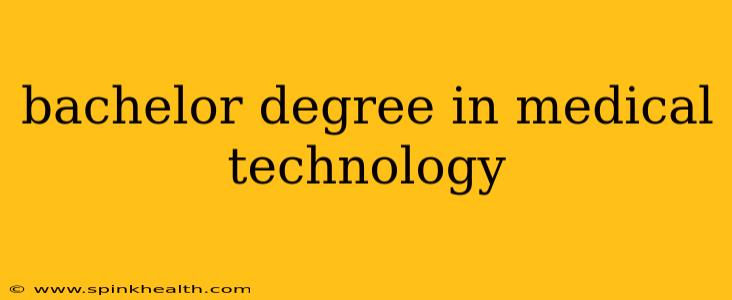A Bachelor's Degree in Medical Technology: Your Path to a Rewarding Career in Healthcare
The air crackled with anticipation. I remember the day I received my acceptance letter to the Medical Technology program – a culmination of years of hard work and a lifelong fascination with the intricate world of healthcare. Little did I know then the journey ahead would be as challenging as it was rewarding, shaping my career and leading me to a deeply fulfilling path. This isn't just a story about a degree; it's a story about a vocation, a passion for unraveling the mysteries of the human body and contributing to better health outcomes.
This article delves into the intricacies of a bachelor's degree in medical technology, covering everything from curriculum specifics and career prospects to the personal qualities required to thrive in this dynamic field. We'll answer common questions about this rewarding career path, providing you with a comprehensive understanding of what it takes to become a medical technologist.
What is a Bachelor of Science in Medical Technology (BSMT)?
A Bachelor of Science in Medical Technology (BSMT) is an undergraduate program designed to train skilled professionals who conduct laboratory tests on patient samples to help diagnose, treat, and monitor various medical conditions. These professionals are vital members of the healthcare team, working behind the scenes to provide accurate and timely results that directly impact patient care. The curriculum is a blend of theoretical knowledge and hands-on laboratory experience, giving students the practical skills needed to succeed in a clinical setting.
What are the typical courses in a BSMT program?
The curriculum is rigorous and comprehensive, covering a broad spectrum of scientific disciplines. Expect a heavy emphasis on biology, chemistry, and mathematics, with specialized courses such as hematology, clinical chemistry, microbiology, immunology, and parasitology. My program also included modules on blood banking, molecular diagnostics, and quality control – essential for ensuring accuracy and reliability in test results. Remember, the specific course offerings might vary slightly from one institution to another.
What are the career opportunities after graduating with a BSMT degree?
Graduating with a BSMT degree opens a wide range of career opportunities in various healthcare settings. Hospitals, clinics, diagnostic laboratories, research facilities, and even pharmaceutical companies employ medical technologists. Many of my classmates secured positions immediately upon graduation, while others continued their education to pursue advanced degrees like a Master's in Medical Technology or specialized certifications.
What are the job duties of a medical technologist?
A medical technologist's day is filled with variety and challenges. It’s not just about running tests; it’s about interpreting results, identifying potential problems, and communicating findings to physicians. Job duties often include:
- Collecting and processing samples: This involves handling blood, urine, tissue, and other specimens, ensuring they are properly labeled, stored, and prepared for analysis.
- Performing laboratory tests: This could range from basic blood counts to complex molecular analyses, using sophisticated equipment and techniques.
- Analyzing results and reporting findings: This is a critical component, requiring attention to detail and a thorough understanding of the implications of test results.
- Maintaining equipment and quality control: Ensuring the accuracy and reliability of test results through regular equipment maintenance and adherence to quality control protocols.
- Collaborating with healthcare professionals: Working closely with physicians, nurses, and other healthcare providers to ensure timely and accurate diagnosis and treatment.
What are the required skills for a medical technologist?
Beyond the scientific knowledge, certain personal qualities are crucial for success in this field. These include:
- Attention to detail: Accuracy is paramount in this profession. Even a small error can have significant consequences.
- Analytical skills: Interpreting complex data and identifying patterns are key to drawing accurate conclusions from laboratory results.
- Problem-solving skills: The ability to troubleshoot technical issues and find creative solutions to challenges is essential.
- Communication skills: Effectively communicating test results and collaborating with other healthcare professionals are critical.
- Strong work ethic: Medical technology demands dedication, precision, and a commitment to accuracy.
Is a Master's degree in medical technology necessary?
While a bachelor's degree is the entry point to the field, a master's degree can provide advanced knowledge and open doors to specialized roles, research opportunities, and potentially higher earning potential. The decision to pursue a master's is often a personal one, depending on career goals and individual circumstances.
My journey as a medical technologist has been a testament to the power of pursuing a career that aligns with your passion. This path is not for the faint of heart; it demands dedication, precision, and a deep commitment to patient care. But for those driven by a desire to contribute to better health outcomes, a bachelor's degree in medical technology can be a truly rewarding and impactful career choice.

